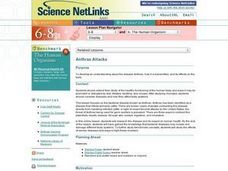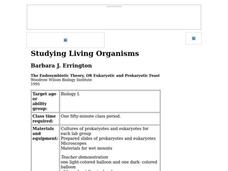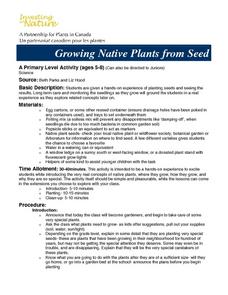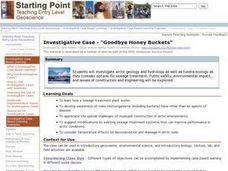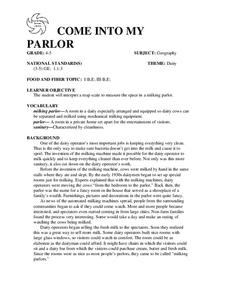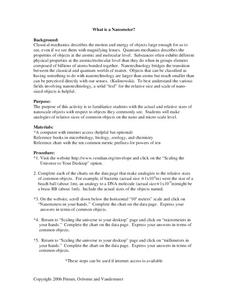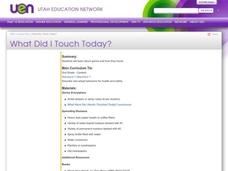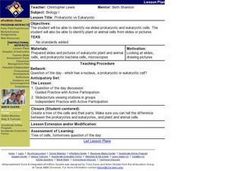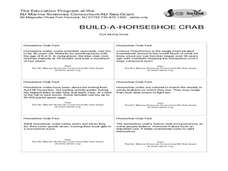Curated OER
Anthrax Attacks
Middle schoolers develop an understanding about the disease Anthrax, how it is transmitted, and its effects on the body. They use this online lesson to research the disease and its impact on human health. Students gain knowledge that...
Curated OER
Settling The Wasterwater Problem
Pupils name models that are representations of larger objects. They suggest ways that industry, agriculture, and mining affect water quality. Pupils demonstrate the use of lagoons for treating wastewater. Students define the following...
Curated OER
USING YEAST AS AN ULTRAVIOLET LIGHT MEASUREMENT TOOL
Young scholars realize the importance of organisms as standards of measurement and experimentation.The first lab is a simple survival curve that demonstrates the effects of UV light on cells. The second lab looks at repair mechanisms of...
Curated OER
Studying Living Organisms
Learners are introduced to Hardy-Weinberg Equilibrium without recourse to algebra. After participating in this activity, students gain a feeling for the significance of the Hardy-Weinberg Equilibrium without using algebra.
Curated OER
Phytoremediation
Students participate in a lab designed to facilitate the clean up and remove of substances ranging from heavy metals to dynamite. They focus on the remediation of copper. They discuss their results of this open ended inquiry experiment.
Curated OER
Teaching Biotechnology With Models
Students will construct models to obtain understanding about the scientific concept. The kinesthetic learners will benefit from the project. There is ample opportunity for all types of learners to be engaged in this instructional activity.
Curated OER
Biocomplexity Lab Activity: Measuring Water pH
Students test unknown solutions for pH levels to determine which organism can live in each environment. They name three substances that they think are acids. Students determine a solution is an acid or base. They define the term pH.
Curated OER
Dirt Life
Students select and collect soil samples from a variety of locations (schoolyard, home, etc.). They do this lab after an interest-generating discussion about "dirt" and microbes. Students make a dilution in sterile water, plate it on a...
Curated OER
Exploring Vaccines
Students explain in a written format how vaccination works and how it draws upon the natural immunity. They differentiate between vaccinations and immunizations. Students identify a number of illnesses that can be prevented by the use of...
Curated OER
Growing Native Plants From Seed
Second graders plant seeds of native plants. They study the concepts of native plants, where they grow, how they grow, and why they are so special. They assess long term care monitoring the seedlings as they grow and write the name...
Curated OER
Goodbye Honey Buckets
Learners investigate arctic geology and hydrology as well as tundra ecology as they consider options for sewage treatment. Public safety, environmental impact, and issues of construction and engineering be explored.
Curated OER
Activity #8 Simulation of Oil Spills
Students conduct an experiment to simulate an oil spill and identify the characteristics of oil in water. They evaluate the effectiveness of various cleanup methods. They discuss the how to clean up an oil spill, and what causes oil...
Curated OER
The Mechanisms of Decay and Decomposition
Eighth graders study how all living things die. They are introduced tot he life cycle and the concept of an ecosystem. Students have a introductory exposure to trophic levels (producer-consumer-decomposer) in the environment.
Curated OER
Germ Busters
Students discuss importance of cleanliness, specifically hand-washing, in fighting germs and illness. They create cultures of their hands before washing, and then practice proper hand-washing technique.
Curated OER
COMPARE SOILS BY GROWING PLANTS
The student will identify the difference in the rate of plant growth in three soils that vary in organic matter.1. Obtain three to four flowerpots, different types of soil, a record chart, three to five beans for each pot, and water....
Curated OER
COME INTO MY PARLOR
Students interpret a map scale to measure the space in a milking parlor. They reveiw the process of using a map scale to calculate distances. Students are given worksheets, they read the information in the box together. They draw an...
Curated OER
Living or Nonliving
Third graders brainstorm a list of the characteristics of living and nonliving organisms. Individually, they find four nonliving and living items and the characteristics that make them fit into one of the categories. To end the lesson...
Curated OER
What is in Soil?
Fourth graders identify and examine the components that make up soil. Individually, they use a magnifying glass to identify the organic and inorganic material in their soil sample. To end the instructional activity, they record the...
Curated OER
Water Filtration
Students explore, analyze, study and demonstrate the procedures that municipal water plants may use to purify water for drinking. They cover the clean water processes of aeration, coagulation, sedimentation, filtration and disinfection.
Curated OER
What is a Nanometer?
Students develop a concept of the relative size of objects in the nanoscale. They complete an internet assignment using the website,"Scaling the Universe to Your Desktop". Using analogies to common objects they get an appreciation for...
Curated OER
Fossil Adventure
Learners work as a class to write a general definition of fossil based on their discussion and examine pictures of the different types of fossils. Once discussion is complete, they write and illustrate a book about a T Rex that has died...
Curated OER
What Did I Touch Today?
Second graders describe and adopt behaviors for health and safety. They explore what germs are and how they can make you sick. Through graphing activities, 2nd graders examine the way germs travel and what they can do to prevent the...
Curated OER
Prokaryotic vs Eukaryotic
Students identify via slides prokaryotic and eukaryotic cells. They identify plant or animal cells from slides or pictures. Students are given the question of the day. They are asked which has a nucleus, a prokaryotic or eukaryotic...
Curated OER
Build-A-Horseshoe Crab
Students discover many facts about horseshoe crabs. Students identify the main body parts of horseshoe crab. They explore the habits of the horseshoe crab and their importances to the ecosystem. Adaptations for younger students are...
Other popular searches
- Viruses and Bacteria
- Bacteria and Virus
- Bacteria Growth
- Germs and Bacteria
- Bacterial Infections
- Bacteria Morphology
- Bacterial Water Pollution
- Culture Bacteria
- Bacteria Viruses
- Bacteria in School
- Bacterial Plasmids
- Bacteria Word Problem


